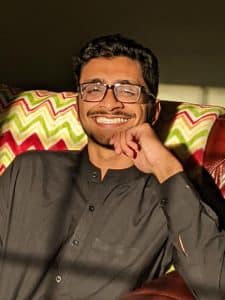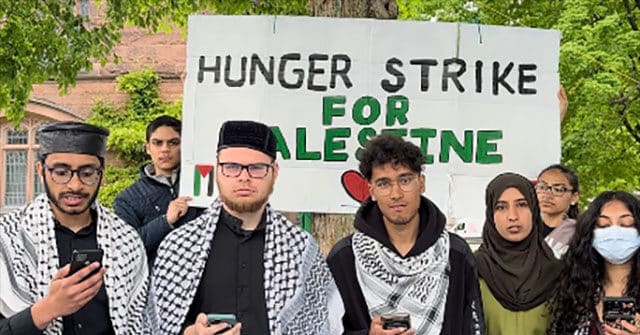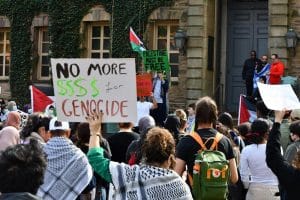Crackdown on Academic Freedom, Says Protester
Persistent obstruction from their administration has forced pro-Palestine protesters at Princeton University to a hunger strike since early May 2024. Student protesters against Israel’s genocide of Gaza, and Princeton’s academic links to Israel, have faced repression, including two arrests and threats from the university’s highest levels, as part of a pattern of American universities cracking down on pro-Palestine activism in the past month.
Muslim Matters was able to contact the spokespeople of the Princeton Israeli Apartheid Divest movement, who explained the circumstances of the standoff and the persistent obstruction they have faced from a university that runs on its student funds. Student spokesperson David Chmielewski notes that the crackdown on Palestine activists is the climax of broader attempts to censor academic freedom: “Unfortunately it’s part of a broader sort of history, and broader present right now, of a crackdown on academic freedoms,” he says in an interview with Muslim Matters. “You’re seeing it across the country, where universities and schools are coming under more pressure for when they teach about race or when they teach about the history of colonialism, and also in, obviously, what Israel is doing in Gaza is destroying so many universities and destroying the entire educational infrastructure. So part of this sort of separate colonial project in both Israel and the United States is this attack on academic freedom.”
Princeton Responds Severely to Pro-Palestine Protests
 Sameer Riaz, another spokesperson, explains that the university administration had repeatedly obstructed any dialogue with the protesters. Since October 2023, students have “been going through the appropriate channels, going to community meetings, trying to speak with administrators to get them to acknowledge that there’s a genocide happening, do something about it, and to start moving towards divestment so that our tuition money no longer goes towards funding this genocide.” This was flatly ignored, but students launched an encampment in late April 2024 as part of a nation-wide campaign against the genocide.
Sameer Riaz, another spokesperson, explains that the university administration had repeatedly obstructed any dialogue with the protesters. Since October 2023, students have “been going through the appropriate channels, going to community meetings, trying to speak with administrators to get them to acknowledge that there’s a genocide happening, do something about it, and to start moving towards divestment so that our tuition money no longer goes towards funding this genocide.” This was flatly ignored, but students launched an encampment in late April 2024 as part of a nation-wide campaign against the genocide.
The response was severe. “At the launch of the encampment the university responded immediately with police force, they arrested two students right off the bat, basically before anything was even set up, and they prohibited the use of tents, they prohibited sleeping outside. And so following the establishment of the encampment the university continued to really ignore any attempt at compromise or discussion of divestment. There was really no attempt to reach out to us or figure out what it is that the students wanted.” The two students, Hassan Sayed and Achinthya Sialingam, were arrested on charges that were never made clear.
“Their Crackdown.. is Very Disproportionate”
Students protested the crackdown with a sit-in at the university’s Clio Hall, but president Christopher Eisgruber failed to heed their grievances and instead doubled down, running against longstanding university tradition. As Chmielewski notes, the university had seen longer sit-ins in the past without the same peremptory backlash: “What in part has become clear is that their crackdown on student protesters is very disproportionate to any other issue that’s arisen in campus history. For example there have been earlier sit-ins in 2015, in 2019, that…actually lasted for longer than the one at Clio Hall that were not actually met with police violence in the same way. Students involved in those situations did not face disciplinary charges in the same way that students involved in the Clio Hall sit-in were. So I think, you know, there seems to be a sort of nation-wide environment across these universities where they’re cracking down on pro-Palestinian speech especially.”
Once more, the university stonewalled any resolution, with its senior official for campus life Rochelle Calhoun going so far as to gaslight the protesters and falsely insinuate that they had been threatening. This prompted a backlash from faculty who had witnessed the events. Calhoun had “characterized the student protesters as threatening and aggressive toward the university staff. And the faculty observers who were present at the sit-in actually contradicted that account…they said actually this is not what happened, the way that she’s describing it is a mischaracterization, and it’s blatantly dishonest and it’s actually putting students in danger because it’s justifying police violence against them by saying that they’re aggressive, they’re threatening, characterizing the protesters as fundamentally unsafe.”
A letter calling for Calhoun’s resignation over this dangerous mischaracterization was signed by over two hundred faculty members, out of some five hundred faculty members in total, within a week.
Outside Harassment of Protesters Ignored by Administration
In spite of the unprecedented faculty support, the university administration has remained stubbornly obstructive. In contrast to some other universities where Zionist counterprotesters have targeted the protests, at Princeton, the rot has been largely at the top. “The main actual harassment we’ve been facing is by university administration as opposed to sort of outside counterprotesters,” Chmielewski observes.
Such harassment as has occurred has, however, been ignored by the administration: “Just the other day…two people came in and vandalized some signs, specifically the sign (that) said that we were hunger striking, and the university police and public safety office didn’t really step in and do anything. So, you know, it’s ironic that the university is often presenting, trying to present us as sort of outside agitators who are creating an unsafe environment, when actually it’s them who’s making us feel unsafe on campus.”
Crackdown on African-American Studies
Nor has this been the only underhanded tactic employed by the administration: “For example a lot of the faculty and students involved in the sit-in were students in the African-American Studies Department, and since then the African-American Studies Department has (come) under attack in national media and for a few days their [previously accessible] building was even locked to the public…So the university is really doing some outrageous things.”
He links this as a particularly extreme example of the sort of political pressures that have been brought to bear on critical narratives across American universities: “Unfortunately it’s part of a broader sort of history (and) present right now of a crackdown on academic freedoms. You’re seeing it across the country, (where) universities and schools are coming under more pressure for when they teach about race or when they teach about the history of colonialism.” He notes the link with Palestine, where Israel has utterly destroyed Gaza’s historically thriving, lively educational infrastructure: “Part of this separate colonial project in both Israel and in the United States is this attack on academic freedom.
Hunger Strike Inspired by Palestinian Political Prisoners

Princeton University pro-Palestine hunger strikers
“The idea of the hunger strike,” Riaz adds, “came from [a] longstanding position of Palestinian political prisoners (against) conditions that they’re facing in Israeli prison and generally protesting their own imprisonment. And it also has a longstanding tradition – the international movement, in the Indian independence movement, in the Ireland independence, independence movement…in America, even, during the movement to divest from the South Africa’s apartheid regime. So we’re drawing inspiration from all of these different facets.”
Another student spokesperson, Areeq Hasan, draws attention to the current tragedy in Palestine, where a famine has been practically enforced on the Palestinians in what Israeli defence minister Yoav Gallant, speaking at the campaign’s beginning in October 2023, explicitly framed as a move to starve the populace. “People read stories (of) Palestinians making bread with animal feed, and also stories of people breaking their fast in Ramadan with grass…these stories never fade. These, you know, give us like the motivation to really empathize with the struggle of this man-made forced famine, and also just motivate our hunger strike in general.”
Pro-Palestine Protesters Condemn Anti-Semitism
Chmielewski is adamant against the widespread efforts to present the pro-Palestine protests as motivated by antisemitism. “Something we should make clear is that (a) movement for Palestinian liberation is for the liberation of all people. And everyone involved in this movement absolutely condemns anti-Semitism and on instances, you know, if there are any instances of anti-Semitism those will be called out by people within the movement. Crucially, there are a lot of Jewish students who are involved in our sort of community and it’s a very interfaith struggle…Just at our encampment here at Princeton, we’ve had Jummah and we’ve had regular prayers that happen in our encampment, and then also, they’ve had Sunday services for example where Christians offer prayers for the people of Palestine, and then also Jewish students have been hosting their own Shabath services at the encampment. So it’s a very interfaith struggle, and it’s one that is made up of people…who are seeking justice and are seeking to be on the side of morality and truth regardless of their religious, their ethnic, their racial background.”
A Shift in Global Consciousness

Princeton pro-Palestine protesters
Given the massive institutional bias toward Israel throughout the United States, can the protesters expect to make a real change? Riaz has no doubts. “Of course I’m hopeful that they’re going to make a change…but I actually sincere believe that they’ve already made a change. I think we’ve seen a massive shift…just in the global consciousness of what (has) been going on between the Israeli government and the Palestinians, how have they historically been oppressing them…they were taboo topics, and now they’ve been kind of brought forth into the mainstream…Obviously there’s still a lot of backlash and it’s a very tense issue…but it is much more mainstream than it used to be. I don’t think in any previous time we would have seen two hundred faculty signing onto a letter like this, you wouldn’t have seen faculty doing solidarity fasts with the people doing a hunger strike in solidarity with Palestinians, you wouldn’t see faculty writing a letter to the administration, you wouldn’t see (really) so many people being willing to, put themselves in support for the Palestinians, and so many people willing to express solidarity with them.”
Chmielewski believes that the protests have overnight affected Princeton’s culture. “Princeton kind of has a reputation of being a school that exists in like an ‘orange bubble’, that’s the phrase around it, people say that students here are sort of apolitical or apathetic, and that there’s not a lot of connection between what happens on campus and what happens in the broader world. But you know, what we’ve been doing here…shows that we’ve definitely sort of shattered the orange bubble, this idea that Princeton is not involved in what happens in the rest of the world. And we’re making more people wake up to the fact that their tuition money and their university is complicit in genocide. And that, I think, is a big victory, just to make people realize that, you know, what happens on this campus matters and that they can have a genuine sort of, that there’s potential for activism on this campus. That’s a big shift from just two weeks ago, where people sort of were thinking of Princeton as apolitical.”
Such a change is already, Chmielewski notes with satisfaction, making itself felt in campus life. “I think this speaks to a broader point, which is that all these encampments are also spaces that are revealing…the kind of world that we want to see after apartheid, after Palestinian liberation. We’re already building that world now.”
Related Posts:
American Muslim Scholars Express Support For University Student Encampment Protests
Zionist Instigators Storm Los Angeles Campus
The post Pro-Palestine Princeton Protesters Launch Hunger Strike appeared first on MuslimMatters.org.
 Hat Porter, pictured at Parliament last week
Hat Porter, pictured at Parliament last week 


